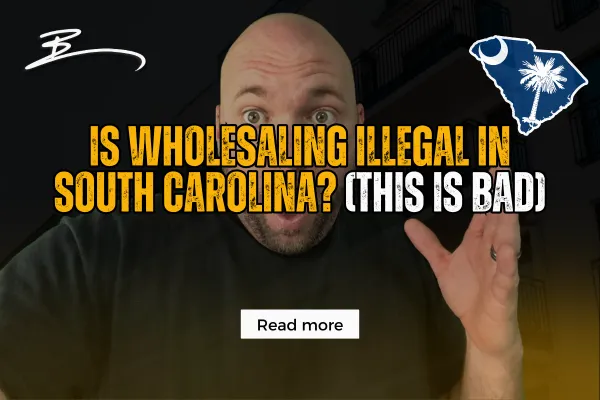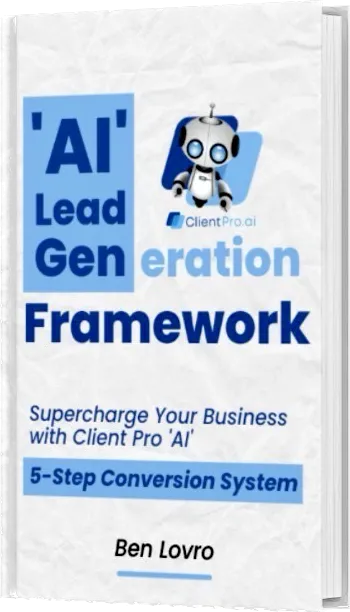Ben Lovro Blogs
AI' Client Conversion Framework

Is Wholesaling Becoming Illegal in South Carolina?
Real estate transactions in South Carolina are changing a lot, causing a lot of debate and worry in the industry. New laws and rules are making people wonder what will happen with property deals in the future. This issue has attracted attention from a wide range of professionals and policymakers, as it holds the
This study will look at how regulations are changing real estate transactions in the state. We will discuss what is driving these changes and how they could affect people in the industry. By analyzing the legal and regulatory developments and considering the perspectives of various stakeholders, we aim to provide a comprehensive overview of the current state of affairs and the potential trajectory it may take in the near future.
Real Estate Wholesaling in South Carolina
Real estate wholesaling in South Carolina is legal, as long as wholesalers strictly adhere to local state laws and avoid engaging in activities that require a real estate license when they are not licensed. The South Carolina Code of Laws Section 36-2-210 validates wholesaling, and the South Carolina Real Estate Commission oversees the pertinent codes.
Co-wholesaling is also considered legal, and wholesalers must be aware of the Real Estate Settlement Procedures Act (RESPA) to avoid penalties. It's important to follow the statutes to comply with state law and consult with a real estate attorney for legal guidance.
Potential Changes and Implications
Wholesaling real estate in South Carolina can be a lucrative business, but it's important to note that the time it takes to generate leads may vary depending on the strategy used. The level of competition varies across different cities in the state, so potential changes in market demand and competition should be carefully considered. It is legal to wholesale real estate in South Carolina, but it's crucial to follow the law diligently, especially considering the recent discussions and regulatory changes highlighted by the South Carolina REALTORS® association.
Misunderstandings between involved parties can arise due to complex legal terms and expectations in the wholesaling process. To mitigate these issues, wholesalers should consider including specific clauses in their wholesale contracts that protect their rights and outline the terms of the agreement. Additionally, staying informed about evolving concerns and regulatory discussions surrounding wholesaling practices is essential to ensure that business operations remain within the legal framework and adapt to market demands.
Recent Commission meetings have discussed the interpretation of advertising real property interests publicly with the expectation of compensation, which may require licensure. Wholesalers should be cautious to ensure that their actions do not cross into areas that would require a real estate license, especially in light of the Cease and Desist Orders issued against unlicensed individuals engaging in unlicensed practice.
Venturing into wholesaling real estate in South Carolina can be profitable and worth the efforts, but wholesalers should be mindful of the legal landscape and potential implications of their activities. Building a strong network of South Carolina real estate professionals can also help wholesalers explore other avenues of real estate investments.
Expert Opinions and Analysis
When venturing into real estate wholesaling in South Carolina, it is crucial to seek expert opinions and analysis to navigate the legal and practical complexities of the industry. Various sources provide valuable insights into the legal stipulations, market analysis, and risk management involved in wholesaling.
Real estate professionals emphasize the importance of compliance with South Carolina's real estate laws, particularly regarding the unauthorized practice of real estate brokerage. They stress the need for clear disclosure of roles in transactions and the equitable interest held when marketing properties. Additionally, expert opinions underscore the significance of structuring contracts properly, often through assignment clauses, to align with state real estate laws and protect all parties involved.
To project potential profits, experts advise wholesalers to consider the after repair value (ARV) of a property alongside the market's supply and demand. They highlight the necessity of conducting thorough market analysis to establish realistic ARVs and set attractive yet reflective assignment fees.
Furthermore, expert opinions stress the importance of performing comprehensive due diligence to evaluate property conditions, legal standing, and potential risks on a deal-by-deal basis. They recommend consulting with real estate attorneys to navigate the legal aspects of contracts, ensure compliance with state regulations, and protect against legal risks.
In addition to legal considerations, expert opinions provide practical guidance on finding distressed properties, conducting property analysis, and developing effective risk management strategies. They offer step-by-step approaches to wholesaling real estate in South Carolina, emphasizing the need for systematic preparation and well-placed investments in legal assistance.
Overall, expert opinions and analysis serve as invaluable resources for individuals looking to establish and maintain successful real estate wholesaling ventures in South Carolina.
Legal Concerns in South Carolina
The legality of wholesaling in South Carolina remains a topic of concern for real estate investors and entrepreneurs. It's essential for individuals in this industry to stay informed about any potential changes in regulations and seek out resources to navigate these challenges effectively.
For entrepreneurs and real estate investors looking to stay ahead in this dynamic field, the resources and training programs offered at. Ben Lovro Resources Can provide valuable insights and guidance. These resources, including ebooks, guides, and comprehensive training courses, offer a step-by-step system for launching and growing a real estate investing business. Additionally, the opportunity to join a high-level mastermind and connect with top real estate investors can be instrumental in navigating the evolving landscape of wholesaling.
To stay informed and equipped for success in the real estate industry, consider exploring the resources available at. Ben Lovro Resources . Stay proactive and prepared for any changes that may impact your business endeavors.
Contact Us

Bet On Yourself
Empowering entrepreneurs and real estate investors with the tools they need to scale.
ben@clientpro.ai
(803) 921-9915
100 Old Cherokee Road ste f 342





